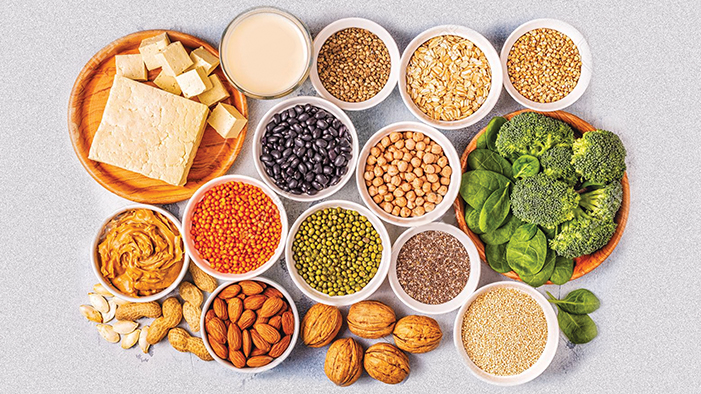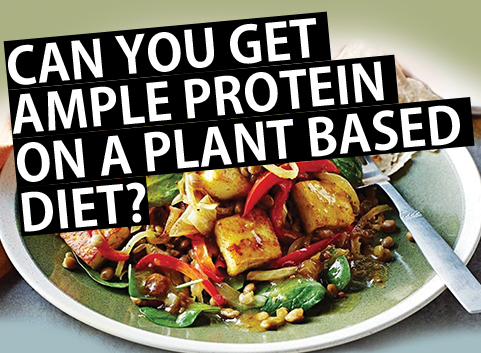Home Diet & Nutrition ample protein diet
Ample Protein Diet
CAN YOU GET AMPLE PROTEIN ON A PLANT BASED DIET ? - By Akshay Chopra
Vegetarian vs Non-Vegetarian debate may never end, but the topic of our concern here pertains to the common myth that ‘vegetarian foods lack good quality & adequate proteins’.

People, especially in the athletic & sports arena, along with the diet & nutrition world, seem to be obsessed with protein intake. A vegetarian or a vegan, is often bombarded with a common question, as to how they get adequate protein. The problem is that none of us, needs it in excess amount, we just need adequate of it.
There is no doubt in the fact, that for a non-vegetarian, getting adequate proteins from animal sources is much easier than his vegetarian and more so, vegan counterpart. The best part about the animal-based protein rich foods like dairy, meat, fish and eggs, is that they are rich in all nine essential amino acids, and specially the three BCAAs, which makes them excellent for sports performance.
However, what we need to understand that, when we speak about complete and incomplete proteins, it is more of a theoretical concept. As when we combine the vegetarian protein rich foods, the amino acids deficiency of one food is covered by the other one, which makes it a complete protein source. For example, cereals, and especially wheat, are particularly limited in their lysine content, and legumes are low in methionine. In comparison to animal proteins, plant proteins have lower levels of leucine, methionine, lysine and tryptophan. Foods such as beans and legumes are rich sources of lysine however, and leucine can be obtained from soy beans and lentils. Other BCAAs can be found in seeds, nuts and chickpeas, meaning that these amino acids can be obtained by consuming a variety of protein- rich, plant-based foods.
Dairy products are excellent source of all EAAs and BCAAs, and should form the base for most vegetarians, specially sportsmen, except for the people who are lactose intolerant (they can still consume whey isolates and curds, buttermilk etc.).
Vegans, who don’t consume any animal products, including milk products, can find it a bit more challenging, but still it’s not a big issue. Pulses, legumes, Soy, whole grains, vegetables, nuts and seeds etc. are all great protein sources, when ingested in adequate quantity.
Acc. to the 2016 Position Statement of the Academy of Nutrition & Dietetics, published in the Journal of Academy of Nutrition & Dietetics, Vegetarian, including vegan, diets typically meet or exceed recommended protein intakes, when caloric intakes are adequate. The terms complete and incomplete are misleading in relation to plant protein. Protein from a variety of plant foods, eaten during the course of a day, supplies enough of all indispensable (essential) amino acids when caloric requirements are met. This is one reason why strict protein combining is no longer considered to be necessary. The regular use of legumes and soy products will ensure an adequate protein intake for the vegetarian, as well as providing other essential nutrients. Protein needs at all ages, including those for athletes, are well achieved by balanced vegetarian diets.
Acc. to a 2019 report by the Academy of Nutrition & Dietetics, it was once thought that plant proteins needed to be combined within a meal by mixing grains and legumes to create a “complete” protein, also called complementary proteins. However, our liver can store amino acids long term, meaning we do not have to combine them in one meal.
On the other hand, plant proteins are naturally packed with other beneficial nutrients like fibre, vitamins, minerals, healthy fat, and antioxidants. They typically contain very little saturated fat, sodium and cholesterol. This may be one reason why vegetarian and vegan diets are linked with a lower risk of disease.
Acc. to the Position Statement of the American Dietetic Association on Vegetarian diets, published in 2009 in the Journal of American Dietetic Association, an assortment of plant foods eaten over the course of a day can provide all essential amino acids and ensure adequate nitrogen retention and use in healthy adults; thus, complementary proteins do not need to be consumed at the same meal. Dietary adjustments such as the use of more beans and soy products in place of other protein sources that are lower in lysine or an increase in dietary protein from all sources can ensure an adequate intake of lysine.
In a 2019 study in the journal Nutrients, a Spanish research team, led by Giorgia Sebastiani, proteins demand during pregnancy and lactation increases up to 1.2 g/kg/day or more. Protein deposition in maternal and foetal tissues increases throughout pregnancy, much more during the third trimester. Enhanced protein synthesis occurs, combined with decreased amino acid catabolism and urea synthesis. Additional protein is needed in pregnancy which is deposited in foetal, placental, and maternal tissues during the second and third trimesters. Proteins derived from plants are sufficient to reach these needs. Legumes, nuts, tofu etc. are good sources of proteins. Soy protein can reach adequate protein needs as animal protein. Cereals content is low in lysine, so this essential amino acid can be acquired by the intake of more beans and soy products.
Pregnant women who adhere to strict vegan diet are at higher risk of protein deficiency, so they need to take care of their dietary needs and balance their protein intake well.
When it comes to muscle protein synthesis, one needs to really understand that you can definitely get all the amino acids from purely vegan sources, but you would have to match and take a variety of protein rich foods. For e.g. soy is a great protein source, but it still doesn’t match up to milk protein like whey or casein, when it comes to muscle protein synthesis, because of a difference in amino acid composition, specially leucine content. Though, the studies have shown negligible differences in the intake on two proteins like soy and whey for lean muscle development.
Acc. to a 2018 study in the journal Sports Science Exchange, by University of Wyoming researcher, Enette Larson-Meyer, there is little evidence to suggest that the protein requirements for athletes following vegetarian diets are different from those following omnivorous diets, particularly given the large range suggested by the current protein requirements for athletes. To ensure adequate protein intake, vegetarian athletes should be encouraged to consume a variety of plant-based protein-rich foods and ensure adequate energy intake. Vegetarians do not need to consume specific combinations of plant-based protein at each meal but should consume a variety of protein sources spread throughout the day.
Acc. to a 2017 study in the Journal of the International Society of Sports Nutrition, British researcher David Rogerson, Plant-based protein supplements that are commercially available include soy (and soy isolate), pea, rice, hemp and composite/blended protein products. Supplemental protein might be of interest to vegan athletes, particularly if achieving sufficient protein via wholefoods is either difficult or inconvenient.
However, Rogerson suggested that, although soy protein possesses a PDCAAS of 1.0 and appears to be comparable to whey protein isolate, when factoring in anti-nutrient factors such as phytic acid and trypsin inhibitors, it limits the absorption of nutrients, whey protein isolate appears to be superior to soy protein when using the DIAAS (1.09 vs. 0.91). Other important plant-based protein sources such as rice, peas and hemp all score markedly lower than animal-based sources such as eggs, chicken and beef using either system. Indeed, it has been suggested that vegetarians might need to consume more protein than meat eaters to compensate for the poorer digestibility of plant-based sources.
In a 2015 study in the Journal of Nutrition, a research team, from Netherlands led by S. Van Vilet, from the School for Nutrition and Translational Research in Metabolism (NUTRIM), Maastricht University, suggested that, the ingestion of the plant-based proteins in soy and wheat results in a lower muscle protein synthetic response when compared with several animal-based proteins, and lower amount of plant protein-derived amino acids compared with animal-based proteins, specially essential amino acids like leucine. However, various strategies may be applied to augment the anabolic properties of plant proteins:
1. Fortification of plant-based protein sources with the amino acids methionine, lysine, and/or leucine;
2. Consumption of greater amounts of plant-based protein sources; or
3. Ingesting multiple protein sources to provide a more balanced amino acid profile.
However, an earlier 2006 study in the International Journal of Sports Nutrition & Exercise Metabolism, by a Canadian research team, led by D.G. Candow, compared the changes in lean tissue mass, strength, and protein catabolism resulting from combining whey protein or soy protein with resistance training. Twenty-seven untrained male and female subjects were assigned to supplement with whey protein (1.2g/kg BW), soy protein (1.2g/kg BW) or placebo (1.2g/kg BW maltodextrin) for 6 weeks. Results showed that protein supplementation during resistance training, independent of source, increased lean tissue mass and strength over placebo and resistance training.
However, the study was done on untrained individuals. But even if we take the results into account, the recommendations from the combined results would always be to combine various vegetarian protein sources, in adequate amounts to get all amino acids in the diet.
Acc. to a 2012 study in the Medical Journal of Australia Open, by an Australian research team, led by Senior Dietician Kate A. Marsh, protein requirements for healthy adults have not been found to differ according to whether dietary protein is predominantly from animal, vegetable or mixed protein sources provided soy protein or a variety of other vegetable proteins is consumed. However, studies comparing single sources of protein have found significant differences between plant and animal sources, particularly with cereal proteins such as wheat and rice, as their low lysine content may be a limiting factor. Consequently, if protein intake was to be restricted to a single plant source, such wheat, rice or legumes (other than soy), then the amount of protein required to meet essential amino acid needs may be increased.
Marsh & team, suggested that, health professionals should encourage vegetarians to include a variety of protein-rich foods each day, not only to ensure an adequate intake of protein, but also to provide sufficient iron, zinc, calcium and vitamin B12. This range of foods should include: legumes such as soybeans, chickpeas, lentils, kidney beans, split peas and baked beans; wholegrains such as brown rice, buckwheat, polenta, quinoa and amaranth; soy products; nuts and seeds; and dairy foods.
GET YOUR FACTS STRAIGHT!

